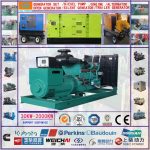Powering Off-Grid Living with Diesel Generators A Comprehensive Guide

Introduction
Off-grid living has become an increasingly popular choice for those seeking self-sufficiency and independence from traditional utility services. Whether it's a remote cabin in the mountains, a tiny house in the woods, or an eco-friendly homestead in the countryside, off-grid living offers a unique lifestyle that requires alternative solutions for power generation. Diesel generators are a reliable and efficient option for providing electricity in off-grid settings, offering a dependable source of power for essential appliances and devices. In this comprehensive guide, we will explore the benefits, considerations, and best practices for using diesel generators in off-grid living scenarios.
Chapter 1: Understanding Off-Grid Living
Off-grid living refers to a lifestyle where individuals or communities are self-reliant in terms of energy, water, and waste management. This often involves living in remote or rural areas where access to traditional utility services is limited or nonexistent. Off-grid living can be a choice made for environmental reasons, a desire for independence, or simply a way to live closer to nature. However, one of the biggest challenges of off-grid living is ensuring a reliable source of electricity for essential needs such as lighting, heating, refrigeration, and communication.
Chapter 2: The Role of Diesel Generators in Off-Grid Living
Diesel generators are a popular choice for off-grid living due to their reliability, efficiency, and ability to provide a consistent source of power. Unlike renewable energy sources such as solar or wind, diesel generators can run continuously regardless of weather conditions or time of day. This makes them an ideal backup power option for off-grid homes, ensuring that essential appliances can continue to operate even during periods of low sunlight or wind.

Chapter 3: Benefits of Diesel Generators for Off-Grid Living
There are several key benefits to using diesel generators in off-grid living scenarios:
1. Reliability: Diesel generators are known for their reliability and durability, making them a trusted source of backup power for off-grid homes. With proper maintenance, diesel generators can provide years of dependable service, ensuring that essential appliances can continue to operate even in remote locations.
2. Fuel Efficiency: Diesel generators are more fuel-efficient than gasoline generators, providing more power output for the same amount of fuel. This can be especially important in off-grid settings where access to fuel may be limited or sporadic.
3. Power Output: Diesel generators are capable of producing high levels of power, making them suitable for powering a wide range of appliances and devices in off-grid homes. Whether it's running a refrigerator, powering lights, or charging electronic devices, diesel generators can meet the electricity needs of off-grid residents.
4. Longevity: Diesel generators are built to last and can withstand continuous use over extended periods of time. This longevity makes them a cost-effective investment for off-grid living, providing reliable power for years to come.
Chapter 4: Considerations for Using Diesel Generators in Off-Grid Living
While diesel generators offer many benefits for off-grid living, there are several important considerations to keep in mind when using them:
1. Fuel Storage: Diesel fuel must be stored safely and securely to prevent contamination and ensure a clean fuel supply for the generator. Proper fuel storage practices are essential for maintaining the reliability and performance of a diesel generator in off-grid settings.
2. Maintenance: Regular maintenance is crucial for keeping a diesel generator running smoothly and efficiently. This includes checking and changing the oil, filters, and other components as recommended by the manufacturer. Neglecting maintenance can lead to breakdowns and costly repairs.
3. Noise: Diesel generators can be noisy when running, which may be a concern for off-grid residents living in close proximity to neighbors or wildlife. Choosing a quiet generator model or installing soundproofing measures can help minimize noise levels.
4. Emissions: Diesel generators produce emissions that can be harmful to the environment and human health if not properly managed. 75kw diesel generator to follow best practices for emissions control and ensure compliance with local regulations when using a diesel generator in off-grid living.
Chapter 5: Best Practices for Using Diesel Generators in Off-Grid Living
To maximize the benefits of using a diesel generator in off-grid living, consider the following best practices:
1. Proper Sizing: Choose a diesel generator that is appropriately sized for the electricity needs of your off-grid home. An undersized generator may struggle to power essential appliances, while an oversized generator can lead to fuel wastage and reduced efficiency.
2. Fuel Quality: Use high-quality diesel fuel that is free from contaminants and additives. Poor-quality fuel can clog the generator's fuel system and lead to performance issues. Consider using fuel stabilizers to prolong the shelf life of stored diesel fuel.
3. Regular Maintenance: Establish a maintenance schedule for your diesel generator and follow the manufacturer's recommendations for oil changes, filter replacements, and other routine tasks. Keeping your generator well-maintained will extend its lifespan and ensure reliable performance.
4. Battery Backup: Install a battery backup system to provide power during startup and shutdown sequences for the diesel generator. This can help preserve the generator's battery and ensure a smooth transition between grid and generator power.
Chapter 6: Conclusion
In conclusion, diesel generators are a practical and reliable solution for providing power in off-grid living scenarios. Their efficiency, power output, and longevity make them a valuable asset for off-grid residents seeking self-sufficiency and independence. By understanding the benefits, considerations, and best practices for using diesel generators in off-grid living, individuals can make informed decisions about incorporating this technology into their off-grid lifestyle. With proper planning and maintenance, diesel generators can provide a consistent and dependable source of power for off-grid homes, enabling residents to enjoy the comforts of modern living even in remote locations.
